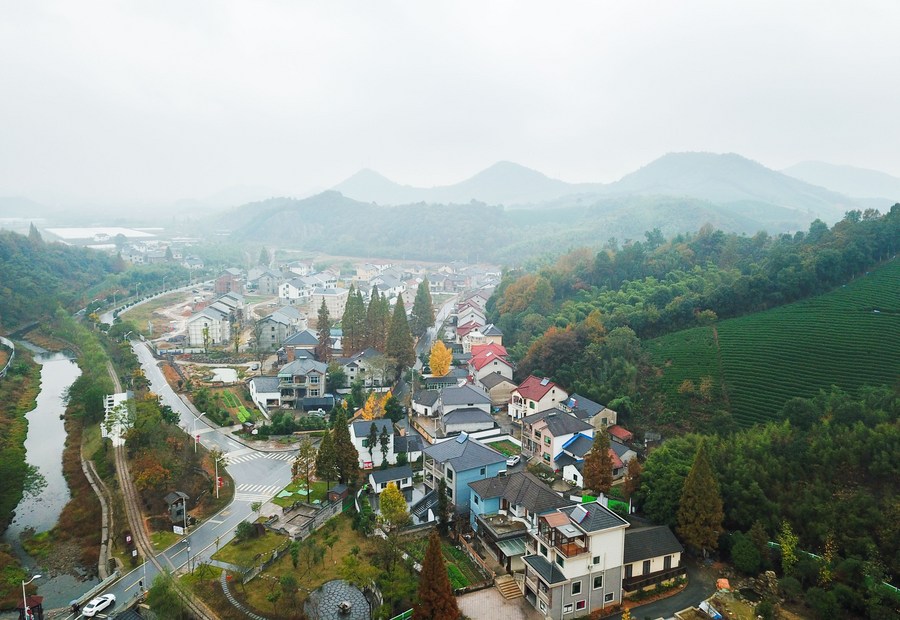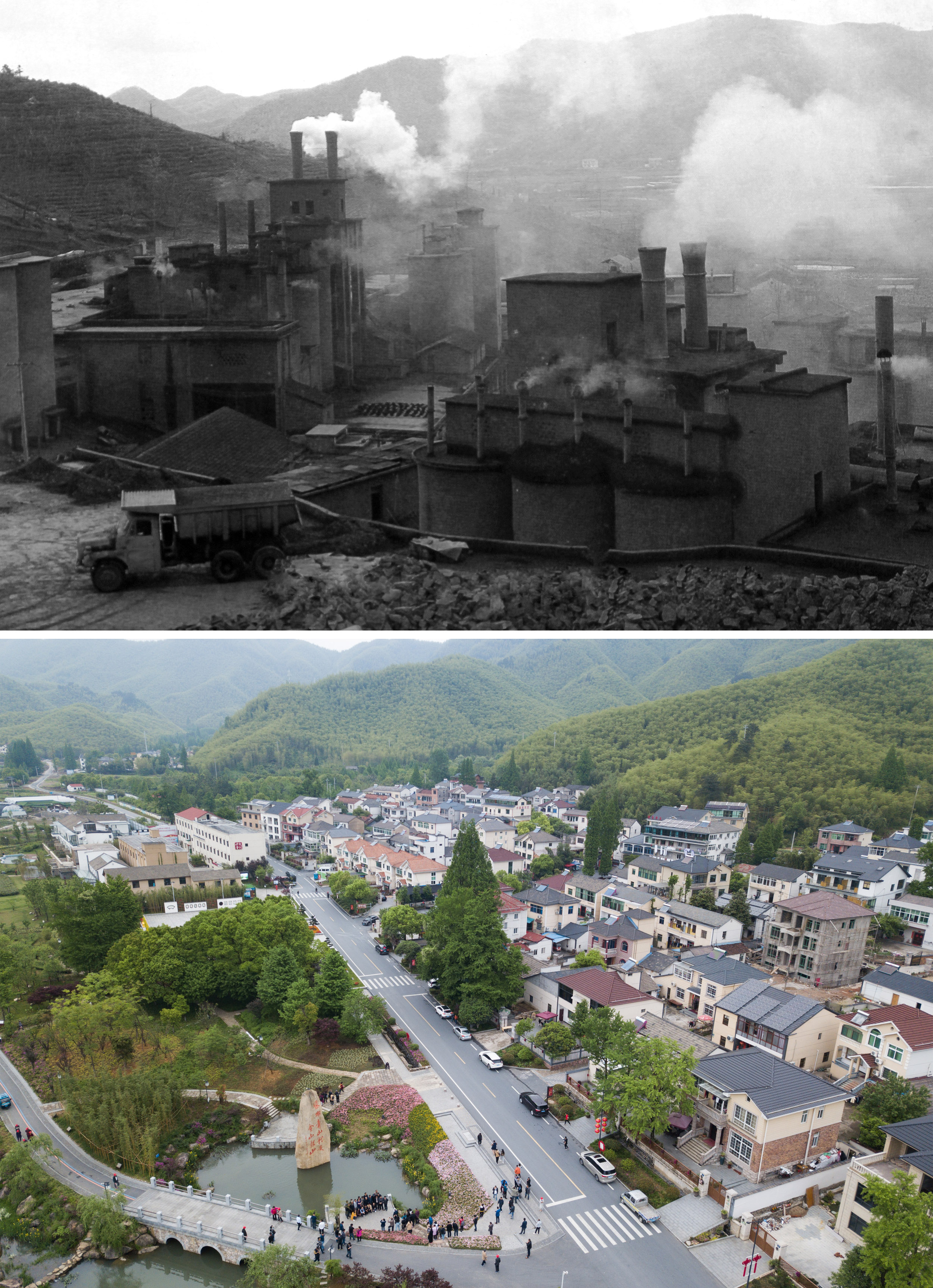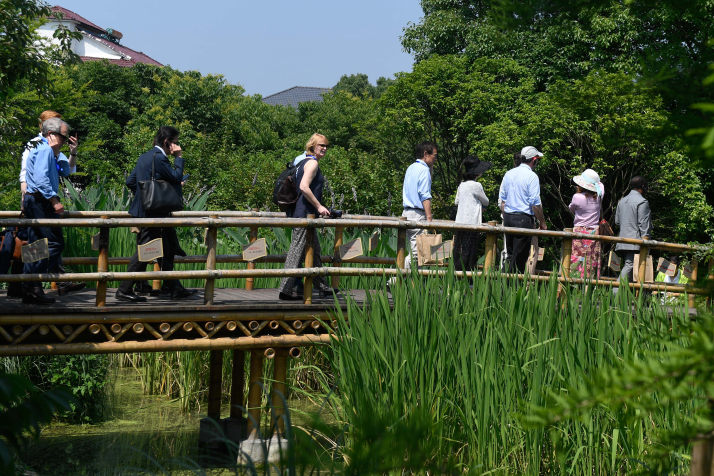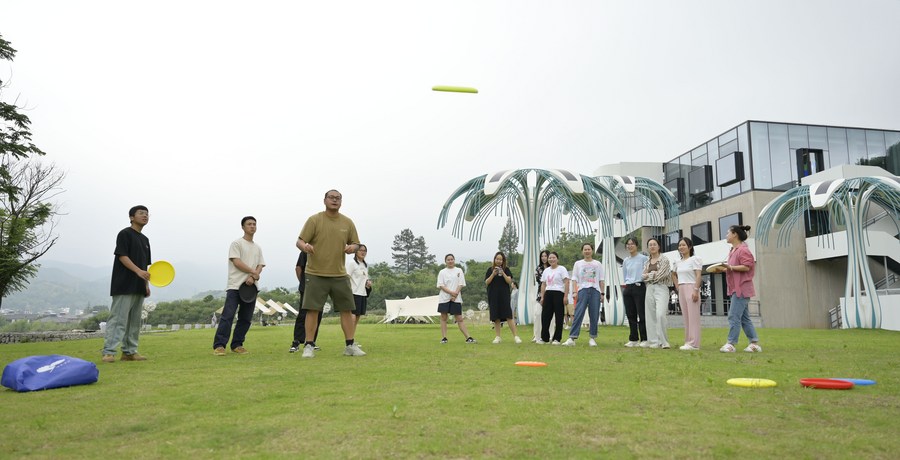
A view of Lujia Village in Anji County, east China's Zhejiang Province, November 16, 2018. /Xinhua
A view of Lujia Village in Anji County, east China's Zhejiang Province, November 16, 2018. /Xinhua
Pan Chunlin, a homestay owner in Yucun Village, finds himself bustling with activity during the holiday season.
Located in Anji County, eastern China's Zhejiang Province, Yucun Village attracts a constant flow of tourists who are captivated by its breathtaking green tea mountains, vibrant flower fields and charming buildings adorned with traditional white walls and black tiles.
However, the present-day appearance of the village is a stark contrast to its former state. In the past, it thrived on cement mills and mines, which served as the backbone of the village due to its abundant reserves of high-quality limestone. Most residents depended on quarrying as their livelihood.
While these industries offered lucrative jobs, they came at a great cost. Throughout the year, the village would be enveloped in a haze of dust and smoke. The mountains bore the scars of massive mine pits, and water sources suffered from pollution due to mining discharge.
Pan, who previously worked as a driver in a local quarry, remembers the grim conditions of that era.
"At that time, villagers relied on this stone for their livelihood, and the whole sky was gray," recalled Pan, who started working in the mine alongside his father at the age of 18.

Yucun village in the 1980s (upper) and 2018. /Xinhua
Yucun village in the 1980s (upper) and 2018. /Xinhua
Twenty years of green development
By the early 2000s, recognizing the grave environmental consequences, the village decided to close down cement plants and mines.
"Mines used to be a main source of livelihood for local people. However, with their closure, villagers have been left without any income, triggering feelings of uncertainty and speculation surrounding this decision," said Bao Xinmin, the Party branch secretary of Anji County at that time.
To provide for his family, Pan set aside his mining hoe and ventured into opening the first homestay in the village.
"At first, my business did not thrive. Tourists did not enjoy their time here due to the poor environment. Despite their initial enthusiasm, they departed with expressions of disappointment," Pan said during an interview with China Media Group.
The challenges faced by Yucun village were gradually overcome through the implementation of the Green Rural Revival Program in 2003, which sought to improve the environment and raise living standards in rural areas.
The program aims to renovate approximately 10,000 incorporated villages, with a particular focus on transforming around 1,000 central villages into models of moderate prosperity in all aspects. Villages were encouraged to take steps such as cleaning up their rivers and addressing the prevalent use of chemical fertilizers and pesticides.
In 2005, Xi Jinping, while serving as the chief of the Zhejiang provincial committee of the CPC, visited the village. It was during this visit that he brought up the concept of "Lucid waters and lush mountains are invaluable assets."
"During the visit, Xi Jinping mentioned that urban residents are increasingly seeking a countryside lifestyle, with opportunities for leisure and enjoyment. He emphasized the potential for developing the tertiary industry in response to this demand." Bao recalled.
Since then, Yucun village capitalized on its rich natural resources, developed industries such as white tea production and chair manufacturing, aligning with the local conditions.

Visitors tour Dazhuyuan Village in Anji County, Zhejiang Province, June 4, 2019. /Xinhua
Visitors tour Dazhuyuan Village in Anji County, Zhejiang Province, June 4, 2019. /Xinhua
In March 2020, Xi Jinping made a return visit to Yucun. Fifteen years later, the transformation of the village into a beautiful and thriving community has become a reality.
During his visit, Xi emphasized the importance of sustainable development, affirming that economic progress should not come at the expense of environmental destruction.
"The ecological environment itself is the economy. All environmental protection efforts will be rewarded," he said.
In 2021, Yucun village was recognized as one of the "Best Tourism Villages" by the United Nations World Tourism Organization. During that year, the village attracted approximately 900,000 tourists, leading to an increase in the per capita annual income of 61,000 yuan. In 2022, the per capita income of the locals further rose to 64,000 yuan.
As of January 2023, the village has achieved the complete implementation of intelligent waste sorting management, with a participation rate of over 90 percent among rural households. Progress has also been made in soil and water conservation, with the conservation rate increasing from 84.5 percent in 2000 to 94.2 percent in 2022.
"The practice of green development in Zhejiang prioritizes meeting the needs of local residents and fosters innovative development approaches," said Huang Zuhui, the dean of the China Academy for Rural Development and the director of Center for Agricultural and Rural Development of Zhejiang University.

Young people play frisbee in front of a youth library in Yucun Village of Anji County, June 5, 2023. /Xinhua
Young people play frisbee in front of a youth library in Yucun Village of Anji County, June 5, 2023. /Xinhua
Innovation-driven growth
The picturesque environment of Yucun village not only attracts tourists, but also encourages college graduates to return and establish their own businesses.
In 2022, the village introduced a global partners program consisting of 42 projects that encompassed research and education, cultural creativity, the digital economy, and the agriculture and forestry industries.
According to He Miao, the Party chief of Tianhuangping Town, which administers Yucun Village, the program has attracted over 1,100 young people from young people from both domestic and international backgrounds. They have come to work and live in Yucun and the surrounding villages.
"Rural revitalization relies on individuals, particularly young people with innovative ideas and energy," said He.
To support young entrepreneurs in Yucun, the local government has proposed the creation of a large community for young talent. The first phase of construction, known as the Qinglaiji Project, will be completed at the end of June. The project covers an area of 30,000 square meters and aims to offer young entrepreneurs a convenient working environment, good ecological conditions, as well as comfortable accommodation facilities.
"The term 'ecology' holds multiple dimensions. It extends beyond lush landscapes and nature preservation to encompass the vast expanses of stars and oceans," said Li Xiaomeng, an entrepreneur in Yucun.
"It represents an open, inclusive, and liberating mindset, where anything can be achieved through the unwavering desire to pursue it."